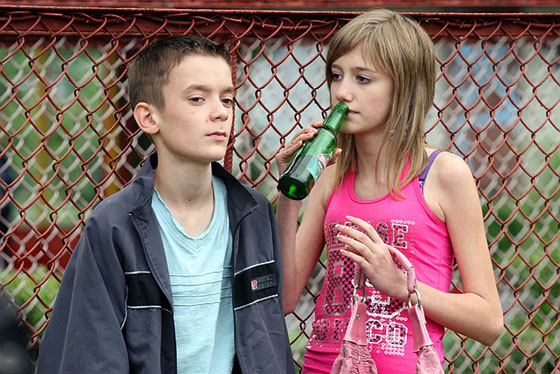
KVIFF 2009 in Czech Republic An Indie Feast
You thought Carlsbad was in New Mexico? The original one is in Bohemia, in the Czech Republic, where the spa city once called Karlsbad is now Karlovy Vary. The citys annual film festival ended July 11th. It was a mix of films from recent festivals and a selection of new films that could be in theaters later this summer and into the fall. Theaters anywhere but the US, that is — all the more reason for film buffs to pay attention to places like Karlovy Vary, and to US festivals that may pick up some of this festivals lineup.
An unintended consequence of the 2000-2008 period in politics has been the declining place of foreign-language or foreign cinema in the US, even as the number of foreign-born Americans is on the rise. Try to see a French film outside New York or Los Angeles. These days, if your film is in a foreign language and you dont have Javier Bardem or Penelope Cruz in your cast, you should pray for an Oscar nomination. In French, even with Catherine Deneuve starring, your movie is likely to vanish in the heartland.
The Karlovy Vary International Film Festival of 2009 marked the twentieth anniversary of the fall of communism, which the US has taken much credit for. Some films looked back to the days before the Berlin Wall came down. Some looked at the unkept promises and mixed blessings of freedom.
Here are my picks:
That Other Border
Piggies (Swinki) by Robert Glinski of Poland is set in the present, on the Polish-German border. Sixty years ago Germany began World War II there and tried to erase Poland from the map. In Glinskis film, Poland is now the source of cheap labor for anything that Germans need. Sound a bit like Mexico?
Glinskis previous film, Hi Tereska (which premiered at KVIFF in 2000), told the story of a young girl from a housing project in Warsaw who falls in with the wrong crowd and loses her future. In Piggies, eager Poles bring their hopes and ambitions to the border, and criminals who exploit them thrive. Human traffic of all kinds is a common theme in new European films. In this one, boys rather than girls feed the demand from rich consumers, in an entire economy of bars and other “entertainment” businesses that function on the toil of the underaged underclass. Glinskis team of young actors bring a believability to the grim drama of Polish youth serving what used to be called the master race. If anything, its too soft. Piggies will remind you that the European continent is a work in progress. Make sure you see it at a festival. Its a long shot for commercial distribution.
A German Comedy?
Post-Soviet thematic territory used to belong to Andreas Dresen of the former East Germany, whose signature style probed the drab idleness of a younger generation left behind by history. Dresens little universe was on just the other side of the Polish-German border from Robert Glinskis, in the sleepy town of Frankfurt, on the Oder. His characters included lay-about kids who didnt fit into Germanys future and an older generation from a would-be forgotten past – not the BMW-driving cannibals of Piggies. Dresens films were tender and gently humorous, but no less realistic as barometers of hope and cynicism.
Now Dresen has moved into new territory. Whisky with Vodka is a backstage comedy echoing the playful manners of a Woody Allen script like Stardust Memories, rather than interpreting the adjusted new realities on the extreme margins of a united Germany. In Wolfgang Kohlhaases script, Otto (Henry Huebchen), is a veteran actor playing a Jazz Age lothario who is irresistible to a seductive teenager and her mother.
Off-screen, Otto is an even worse rake and a drunk, so the younger director of the film bets against potential losses by hiring an understudy for Ottos role, the ultimate insult. In this portrait of a shallow man who cant escape the typecasting of his previous 50 films, Dresden turns his gaze to cinema-about-cinema with wit and elegance. He also takes a poignant look at the inevitability of aging, all the more poignant in a profession that celebrates youth.
Through Otto, the once-analytic Dresen offers an everymans skepticism of geopolitics: “What did the Russians achieve besides pushing the vodka border further West?”
Persian Realism
Iran, where politics are intensely present-tense, was represented by Twenty, Abdolreza Kahanis ensemble drama. The title of the film comes from the 20 days employees of a banquet-hall are given before the owner shuts it down and sells it to a developer for demolition. Sounds a lot like America, but most of these employees in Kahanis realistic story, pre-the-recent-protests, live in the basement.
The role of a young widow with child, facing homelessness, is played by the Iranian superstar Mahtab Karamati (disguised on-screen in heavy makeup), which may explain why the grim film was a hit in Tehran this year. Iranians prefer comedies, Kahani said. Like just about everything else at Karlovy Vary, its a long shot for distribution in the US. Kahani, the director, noted that his two previous features had been banned in Iran, but limited his political comments to the hope that he might reach his audience one day without any government interference. Wish him luck. His reluctance to say much more on camera at a festival press conference suggested that criticism might earn him a rude greeting on his return.
coming soon: Russian Musicals in West Side Story mode
